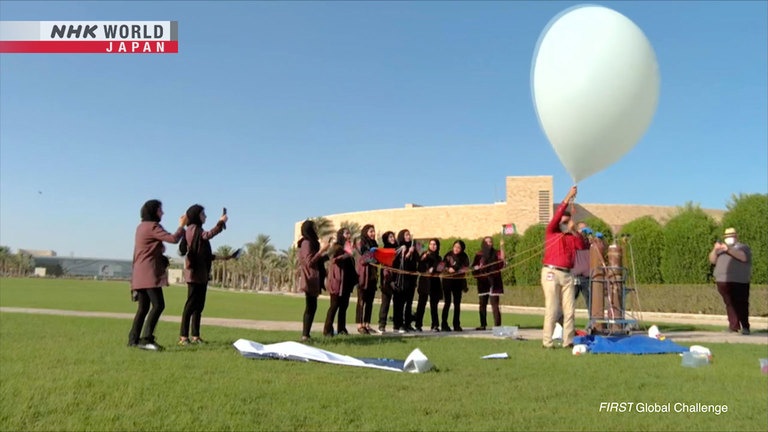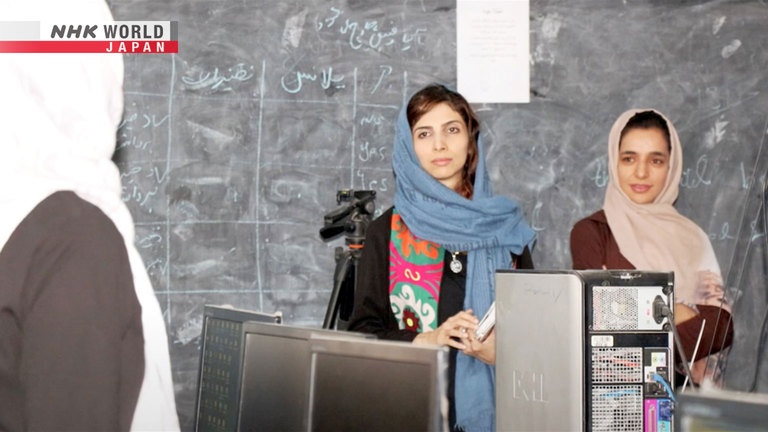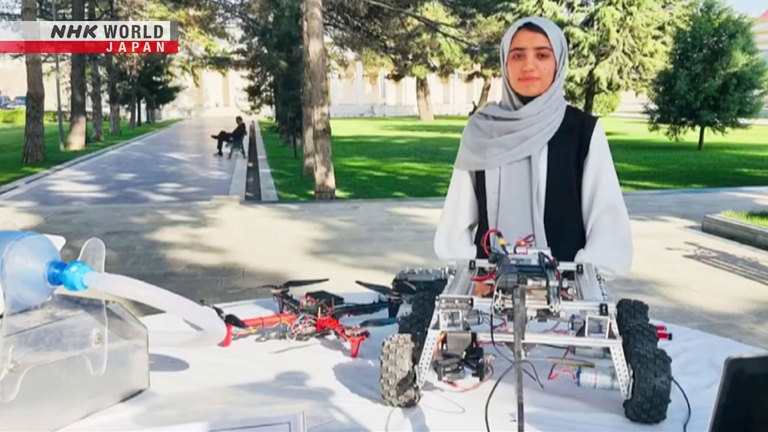Resilient Afghan Tech Women: Roya Mahboob / CEO of Digital Citizen Fund
A female entrepreneur formed a robotics team of teenage girls in Afghanistan. Undaunted by the Taliban's return to power, she struggles to change the future of Afghan women through digital literacy.




Transcript
Direct Talk
In August 2021, the Taliban militant organization
seized power in Afghanistan.
Behind the scenes, one group of people escaped from
the country and fled to the neighboring country of Qatar.
They are the members of the "Afghan Dreamers"
a robotics team made up of girls
between the ages of 12 and 18.
After their escape, the girls participated in
an international robotics competition.
They were praised for their efforts
and won the Judges Award,
attracting attention from around the world.
The team was formed by
one of Afghanistan's first female IT entrepreneurs
who is now based in New York, Roya Mahboob.
She is committed to building
digital literacy among Afghan women,
empowering them to overcome the barriers of
a conservative, male-dominated society.
Acceptance and cautions has never changed the world.
If you do not have a day to dream of something's different,
and nothing will be ever changed.
Undaunted by adversity she is using the power
of technology to pave the way for Afghanistan's future.
Resilient Afghan Tech Women
Technology and engineering has been
changed my life and it helped me to,
you know, confidence in my ability
and I wanted that other young girls
have the same opportunity.
For the young girls,
when they get engaged with STEM education,
they can, you know, develop your knowledge
and increase your knowledge and also
they can learn how to solve the problem,
they can learn how to work as a team, to learn discipline,
and they learn how to be creative,
and how to working together.
Mahboob has been teaching technology to Afghan girls
as the CEO of the Digital Citizen Fund,
the organization she launched in 2013.
It covers a wide variety of themes,
including STEM, robotics, finance, and cryptocurrency.
One of its most notable achievements
has been the robotics team formed in 2017,
exclusively for girls between the ages of 12 and 18.
What inspired Mahboob to form the team
was something that the organizer of
the FIRST Global robotics competition
in the United States told her.
"Either find a team of teenagers or build a team",
and I thought that why not to
build a team and why not all girls'team
because this definitely send the message for the
woman in Afghanistan, also to the woman in the world.
After the competition, the team continued
its activities both at home and abroad.
However...
In August 2021, the team faced a trying time
as the Taliban expanded its influence.
The girls in the robotics team were often
exposed to the media, which was potentially dangerous.
Moreover, an international competition was approaching
so Mahboob decided to move the girls from Herat,
where the team was based, to Kabul
and to look for destinations abroad.
And I remember that we talked, it was early morning
that I asked them to go to do the test of Corona (virus)
and go to the airport.
On the way, they told me that
"Oh you know we've seen the Taliban
with their cars are in city",
and I say, "Well, you know, don't worry, I don't think that
they might not be able to take over the country that soon."
They went to the airport, but unfortunately,
you know, what's happening in our airport.
It was a shock for everybody.
The government's change overnight or politicians change
and they escaped. And it's created a chaos.
And I can't tell you that how was hard for me
to do just thinking that we are responsible of
all this teenagers, young girls, that they are with us.
Their families believe and trust us
to find a way that to take them to security.
At the same time, I just contacted the Qatari Government.
The Qataris very fast to respond and they say that
they can help me with evacuations of the girls.
And they went to Qatar to continue their educations.
The girls were no longer able to return home.
One of them recalls her escape.
When we enter to the plane we were so sad
because we left everything in Afghanistan.
We had dreams, we left our families,
we left our friends, we left all of relatives,
and without saying any goodbye to them.
The girls were completely unprepared
for the competition they intended to join.
However, they still wanted to participate in the event.
I'm really actually proud of them.
When they arrive, I told them that
we cannot do this competition, you need, you know,
to be thinking about your future and you need time.
And the students says no,
they have to do it because they feel that
there's still a responsibility to compete in this competition
and bring that attention of the world again
to the Afghanistan side.
So they'd not forgotten the millions of the
Afghan womens and Afghan girls that
they are denied to continue their education.
That was amazing. I mean,
that was a beautiful when we heard that
and you know, Afghan community
and many across the world
are inspired by, you know, these young resilient girls,
and determined girls that to...
they want to make the changes in their society.
Mahboob herself has had to face many obstacles,
but she has always persevered in the face of them.
She was born in Afghanistan in 1987.
She left her country during
the Soviet invasion and previous Taliban regime
and grew up as a refugee in Iran.
After the chaos had subsided, she returned to her country,
and she was 16 when she encountered computers
at one of the Internet cafés that had sprung up.
There is a magic box that you can connect you with the world,
and you can talk any information,
and you can find anything you want.
And I was so curious to see this magic box.
And I make determined to make
somehow technology to be the center of my career.
She acquired a bachelor's degree
in Computer Science from Herat University.
Then, in 2010, she launched a software
development company in order to create jobs for women.
But no one would do business with the company
because it was run by a woman.
And so she...
Creating an environment to find the clients
and not be limited to the border of a country.
I could use the LinkedIn to
find my clients outside of the country
and technology has helped me to overcome those barriers.
Another obstacle was that there was no way to pay women.
Many women in Afghanistan did not have a bank account
because they needed permission
from their families to open one.
In the midst of all this, Mahboob found a way
to make a go of it in Bitcoin,
the cryptocurrency that was still little known at the time.
We started to do all of this payment system using the Bitcoin.
Actually, it allows us to bypass the physical and
social barriers of the you know, to paying the women.
And with one push of the button,
Bitcoin magically appears in the woman's digital wallet.
And, you know, this is something that was very safe.
Many women could save their moneys and
no one knows that they have, you know,
they're working at home, and they're receiving the money.
You know, it was your own money.
The power of technology removes barriers
surrounding women and makes them independent.
The conservative society did not accept her.
She was harassed, making it difficult
for her to work in Afghanistan.
She felt she had no choice
but to relocate to the United States.
This is what the extremists want.
When you are succeed, and you want to
bring the change in society because you are one person,
it's easy for them to take you out of the way,
and not accept the changes.
But I thought that what about you built
hundreds and thousands, you know.
Many of the people are young woman
who do the same things.
When you make it normalized,
and you have more women who do the similar things,
it will be difficult for conservative groups, so you know,
for every male-dominated industry, for anyone,
to take you down.
And that's why I wanted to focus on
the Digital Citizens Fund.
With the goal to create the technologies and
accessible option for everyone, but especially
for the women in the conservative countries.
Even if one person can't do it,
a bunch of thousands can make a difference!
With this belief, she launched Digital Citizen Fund in 2013
and since then has traveled between
the United States and Afghanistan
to teach digital literacy to tens of thousands of girls.
The robotics team was formed in 2017,
and in recent years plans had been in progress
to build institutions of higher education.
This way, Mahboob's dream was close to becoming reality.
However, the country collapsed in 2021
and domestic activities came to a halt.
Still, not all her previous activities had been in vain.
In fact, cryptocurrency, which she has been using
as a payment method for about 10 years
has now become useful for helping her friends.
When the fall of the Afghan government, unfortunately,
the banking system was also collapsed.
And during the last couple of months,
it was the only way that we can send safely
the money to our staff in the country.
And that was the reason that
they could pay for the rents, for the security and, you know,
we could take the people, some of the
people evacuated them and send them to other countries.
And thanks to the you know, technologies
like Blockchain and, as well, cryptocurrency.
Mahboob sees the blow to Afghanistan's banking system
as a good opportunity to build a new social infrastructure.
We have some cases that, you know,
when the Taliban coming to the city,
they, they had access to the banking of,
like to the database of all like biometric information of the,
you know, the soldiers in the army
and all like important like, information.
It's put the lives of the people in the risk.
That's why it's also important that
we continue thinking about that.
In the future that how to using the technologies
like Blockchain more and more,
especially in developing countries
and a countries that they are, have conflict.
On top of this, she believes that this Taliban regime
will be different from the previous ones.
She says it is the younger generation
born since the last Taliban regime,
which makes up 60% of the population,
that holds the key to this.
They grew up with the cell phones,
they grew up in a democratic era,
they grew up with access to the information, to knowledge
and to have a dream of a brighter future for themselves.
So the environment and the contents has changed,
and it will change Taliban.
They cannot bring us to the 1990s.
And for that, they have to change themselves.
They have to have created an inclusive government.
I think that there are a group of Taliban that
they understand and they want it to be changed.
Mahboob and her students are preparing to speak out:
they plan to hold an exhibition in Qatar in 2022
to showcase the low-cost respirators
and UV disinfection robots
they have built during the pandemic.
And we're gonna invite Taliban leaderships.
I don't know if they are coming, but it's supposedly that
we invite them and they can come
and see that, what are the young teenagers and
young woman in Afghanistan are capable of to do.
I mean, if a young woman at the age of 19 and 16, 17,
get involved in during the pandemic,
build a ventilator to save lives,
and if they're building a UV light to kill the virus and germs,
how can they deny the education
for the young girls, for the half of the population,
how they can deny it?
The future is still uncertain.
But I hope for the many of the young generation are
still in Afghanistan, they are hopeful for their future.
My robotic team members, what they told me that
they want to go with the next 10 years to the Mars.
Their dreams. Their, you know,
the talent that they have should be realized,
and what you wanted from international community,
do not forget about Afghan women.
And what is her motto?
"Dream big, work hard and make it happen!"
I always dream big. And I think that
they see dream big, and we have ambitions,
and work hard to... for those dreams,
they might be coming true.
And for me, it's always happened like that.
And that's why I don't give up, because it gives me hope.
And it's today's a darkness, you know,
and many feel hopeless in Afghanistan,
but still I have a dream.
I have a dream to build this
Dreamers School in Afghanistan.
I still have a dream that we
making young women that lead the businesses
and professional women, you know,
in engineering, in the science and technology.
And I dream big, but also I'm going to work towards
those my dreams to making sure that it's happen.
I'm not going to give up!